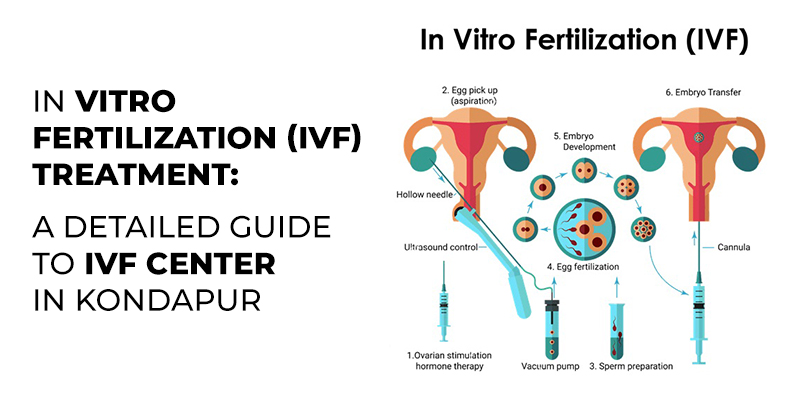In Vitro Fertilization (IVF) Treatment: A Detailed Guide to IVF center in Kondapur
Sometimes, even though couples try their best for a year or more, they might not be able to get pregnant. This can be confusing and upsetting, and it’s called infertility. It’s like wanting to plant a seed in your garden, but even with watering and sunshine, it just doesn’t sprout. There are many reasons why this might happen, like small problems with the way the body makes eggs or male gametes, or with the path they take to meet each other. Doctors run tests to determine what might be happening. One way to help couples facing infertility is called In Vitro Fertilization, or IVF for short. It’s a big word, but it means “making a baby in a glass” say the experts of the best IVF center in Kondapur
Best IVF Center Near Me Kondapur
At the Best IVF center near me, Kondapur Doctors carefully take the egg from the woman’s body, and they collect male gametes from the man. Then, in a special dish outside the body, they mix the egg and male gametes. If the egg gets fertilized by the male gametes, it starts to grow into a tiny ball of cells called an embryo, which is like the very first stage of a baby. Once the embryo is healthy and strong enough, doctors gently place it back inside the woman’s body, hoping it will implant and grow into a healthy pregnancy, just like a seed taking root in the garden.
This process can take a few steps and can feel like a long wait, but it’s given hope to many couples who couldn’t have a baby on their own. However, it’s important to remember that IVF isn’t always successful, and it can be expensive and emotionally draining, just like gardening can sometimes be unpredictable and require a lot of care.
If you’re worried about infertility or thinking about IVF, the most important thing is to talk to a doctor. They can answer your questions, explain all your options in a way that’s easy to understand, and support you on your journey to building a family, however, that might look for you. Remember, you’re not alone, and there are people who can help you through this.
What is IVF?
In vitro fertilization (IVF) is a medical procedure designed to assist individuals or couples struggling with fertility issues in achieving pregnancy. This process involves combining an egg and male gametes outside the body in a laboratory dish to create an embryo. First, the woman typically undergoes ovarian stimulation through hormone medications to produce multiple eggs. These eggs are then retrieved through a minor surgical procedure. Meanwhile, the male partner provides a male gametes sample.
Once the eggs and male gametes are collected, they are carefully combined in a controlled environment, allowing fertilization to occur. After fertilization, the resulting embryos are monitored for a few days as they develop. In some cases, preimplantation genetic testing may be conducted to screen for genetic abnormalities before selecting a healthy embryo for implantation.
The selected embryo is then transferred into the woman’s uterus, with the hope that it will implant and develop into a successful pregnancy. Any additional viable embryos can be cryopreserved for future use. IVF offers hope to individuals facing challenges in conceiving naturally, providing a method to overcome various fertility obstacles and increase the chances of achieving a successful pregnancy. It’s a complex yet effective procedure that has brought joy to many families worldwide.
Who can benefit from IVF?
IVF can actually help many different kinds of people facing different challenges on their journey to parenthood.
Couples facing specific challenges:
- Blocked Fallopian tubes: Imagine the fallopian tubes as tiny tunnels that the egg travels through. If these tunnels are blocked, the egg and male gametes might not be able to meet naturally. IVF helps by taking the egg and male gametes outside the body, where they can be mixed together in a controlled environment.
- Low male gametes count or poor male gametes motility: Sometimes, the man might not have enough healthy male gametes, or the male gametes might not be strong enough to reach and fertilize the egg. IVF can help by using a special technique to choose the healthiest male gametes for fertilization.
- Ovulation problems: Some women might not ovulate regularly, meaning the egg doesn’t get released from the ovary. IVF can help by using medication to stimulate ovulation and ensure there are healthy eggs available.
- Unexplained infertility: Sometimes, doctors might not be able to find a specific reason why a couple is struggling to conceive. IVF can still be an option in these cases, offering hope for a successful pregnancy.
Beyond couples:
- Single individuals: IVF can also help single individuals and same-sex couples who want to build families. This might involve using donor male gametes or donor eggs, depending on the specific situation.
- Individuals with genetic concerns: If there’s a risk of passing on a genetic condition, IVF can be combined with preimplantation genetic testing (PGT). This allows doctors to test embryos for certain genetic disorders before implantation, increasing the chances of a healthy pregnancy.
- Preserving fertility: Individuals facing medical treatments that might impact fertility, like chemotherapy, can also consider using IVF to freeze eggs or male gametes beforehand. This preserves their fertility for future use.
It’s important to remember that IVF isn’t a one-size-fits-all solution, and it’s crucial to talk to a doctor about your circumstances. They can assess your needs, discuss your options in detail, and help you decide if IVF is the right path for you.
Success rates and factors influencing them
The success rates of in vitro fertilization (IVF) can be influenced by various factors, and understanding these factors is essential for individuals or couples considering this fertility treatment. One crucial element is the age of the woman undergoing IVF. Generally, younger women tend to have higher success rates because they often produce healthier eggs.
Another influential factor is the overall health of the individuals involved, including both partners. Conditions such as obesity or being underweight can impact the success of IVF. Additionally, underlying health issues, such as diabetes or polycystic ovary syndrome (PCOS), can affect the chances of a successful pregnancy.
The quality of the male gametes and the ovarian reserve of the woman also play significant roles. A comprehensive assessment of both partners’ fertility health is conducted before proceeding with IVF.
The specific cause of infertility is a critical factor as well. IVF can be particularly successful for certain causes of infertility, such as tubal issues or male factor infertility. However, for conditions like diminished ovarian reserve, success rates may vary.
The number of previous IVF attempts can influence success rates too. Couples undergoing their first IVF cycle may have different outcomes compared to those who have undergone multiple attempts.
Advancements in reproductive technology, laboratory techniques, and the expertise of the fertility clinic also contribute to success rates. Choosing a reputable and experienced fertility clinic can positively impact the chances of a successful IVF outcome.
Emotional well-being and stress management are non-medical factors that shouldn’t be overlooked. Going through fertility treatments can be emotionally challenging, and finding ways to reduce stress may positively influence the success of IVF.
The IVF Process:
- Pre-treatment:
If you’re considering IVF, there are some important steps you’ll take before the actual procedure begins. This is called the “pre-treatment” phase, and it’s like preparing the soil and seeds before planting your garden. Here’s a breakdown of what happens:
- Initial Consultation with a Fertility Specialist: This is like having a meeting with a gardening expert. You’ll talk about your goals for having a family, your medical history, and any past attempts at conception. The specialist will listen carefully and ask questions to understand your situation better.
- Medical Tests and Evaluations: Just like a gardener tests the soil to see if it needs any special care, the specialist might recommend various tests for both partners. These could include blood tests to check hormone levels, ultrasounds to see the health of your eggs and uterus, and semen analysis to check the male gametes count and quality.
- Choosing Male gametes and/or Egg Source: Depending on your individual circumstances, you might decide to use male gametes and eggs from yourselves (partner), or you might need to consider other options. This could involve using male gametes or eggs from a donor, or even using a combination of your own and donor eggs or male gametes. The specialist will guide you through these options and help you make informed decisions based on your specific needs and preferences.
- Understanding Insurance Coverage and Financial Considerations: Like any big project, IVF can involve some costs. The specialist will help you understand your insurance coverage and what might be covered financially. They can also discuss other financial aspects of IVF and offer guidance on managing the costs associated with the process.
- Ovarian Stimulation:
- Ovarian Stimulation:
Ovarian Stimulation is a pivotal phase in the in vitro fertilization (IVF) process, involving the administration of fertility medications to stimulate the ovaries for the production of multiple eggs. The success of IVF often hinges on the quantity and quality of eggs retrieved, making this phase a critical component of the overall treatment protocol.
- Medication Administration:
The process begins with the introduction of specific fertility medications, commonly gonadotropins and sometimes GnRH agonists or antagonists. These medications serve to stimulate the ovaries to produce multiple follicles, each potentially containing an egg. Understanding the types of medications is fundamental, as they play distinct roles in regulating reproductive hormones and promoting follicular growth.
Injections are the primary mode of administering these medications, necessitating a comprehensive understanding of the injection process. Patients are educated on self-administration, ensuring they are equipped with the knowledge and skills to perform the injections at home. The injection process can initially seem overwhelming, but with proper guidance, individuals or couples undergoing IVF become adept at managing this crucial aspect of the treatment.
- Monitoring Follicle Development:
Continuous monitoring of follicle development is integral to the ovarian stimulation phase. This is typically achieved through a combination of ultrasound scans and blood tests. Ultrasound scans provide a visual assessment of the ovaries and the growing follicles, while blood tests measure hormone levels to gauge the ovarian response to stimulation medications.
Ultrasound scans are non-invasive imaging procedures that allow fertility specialists to visualize the number and size of developing follicles. These scans are conducted regularly throughout the ovarian stimulation period to track the progress of follicular growth. Blood tests complement this by measuring hormone levels, particularly estradiol, providing additional insights into ovarian response.
- Determining Egg Retrieval Timing (Trigger Shot):
The precise timing of egg retrieval is crucial for a successful IVF cycle. Once the follicles reach an optimal size, a trigger shot, typically comprising human chorionic gonadotropin (hCG), is administered. This shot induces the final maturation of the eggs within the follicles, preparing them for retrieval. The timing of the trigger shot is meticulously calculated to ensure that the eggs are at the appropriate stage of development. Too early or too late retrieval can impact the quality of the eggs retrieved. Therefore, fertility specialists closely monitor follicular development, adjusting the timing of the trigger shot to maximize the chances of harvesting mature and viable eggs during the subsequent egg retrieval procedure.
- Egg Retrieval:
- Egg Retrieval:
Egg retrieval stands as a pivotal and delicate stage within the in vitro fertilization (IVF) process, marking the culmination of the ovarian stimulation phase. This intricate procedure involves the extraction of mature eggs from the ovarian follicles for subsequent fertilization in the laboratory. A thorough understanding of the egg retrieval process, including the procedural aspects and post-retrieval expectations, is crucial for individuals or couples embarking on the IVF journey.
- Procedure Explanation:
Egg retrieval is typically conducted as an outpatient surgery, designed to be minimally invasive while ensuring optimal conditions for the retrieval of mature eggs. The procedure is performed in a specially equipped fertility clinic or reproductive center. To enhance patient comfort, sedation is administered, inducing a state of relaxation and ensuring that the individual undergoing the procedure is not in pain.
The actual retrieval involves the use of a thin, specialized needle, which is guided through the vaginal wall into the ovaries using ultrasound imaging. This needle is inserted into each mature follicle, and the fluid containing the eggs is gently aspirated. The entire process is meticulously performed by skilled fertility specialists, and the extracted fluid is promptly examined in the laboratory to identify and collect the mature eggs.
- Expected Discomfort and Recovery:
It is natural for individuals to anticipate some level of discomfort during and after the egg retrieval procedure. However, it is important to note that the discomfort is generally minimal due to the sedation administered throughout the process. Patients often describe the sensation as pressure or mild cramping.
- Male gametes Collection:
One of the steps involved in the IVF process is male gametes collection. This might sound simple, but it’s an important part of the process, just like selecting healthy and strong seeds is important for successful gardening. Here’s what you need to know:
- Partner or Donor Sample Collection: Depending on your specific situation, the male gametes sample can come from your partner or from a donor. If you’re using your partner’s male gametes, the doctor will provide instructions on how to collect a sample at home on the day of egg retrieval. This is usually done through a process called masturbation, where the male gametes are collected in a sterile container provided by the clinic.
- Importance of Sample Quality and Preparation: Just like healthy seeds produce stronger plants, the quality of the male gametes sample is crucial for the success of IVF. Here’s why:
- Male gametes count: The number of male gametes in the sample is important. A higher male gametes count increases the chances of fertilization.
- Male gametes motility: This refers to the ability of the male gametes to move and swim. Strong, motile male gametes are more likely to reach and fertilize the egg.
- Male gametes morphology: This refers to the shape and size of the male gametes. Male gametes with normal morphology have a better chance of fertilizing the egg and developing into a healthy embryo.
The doctor might provide specific instructions to improve male gametes quality before collection, like avoiding certain foods or drinks, abstaining from sexual activity for a few days, or taking certain supplements. Once collected, the male gametes sample is carefully analyzed by the laboratory to assess its quality and motility before it’s used in the fertilization process.
- Fertilization: The Dance of Egg and Male gametes
This stage is like the grand ball where the egg and male gametes meet, hoping to create a spark. There are two main ways this “dance” can happen:
- Conventional Insemination: Imagine placing the egg and male gametes in a spacious ballroom and letting them mingle naturally. This is similar to conventional insemination, where the eggs and male gametes are mixed in a special dish, allowing the male gametes to fertilize the egg on their own.
- Intracytoplasmic Male gametes Injection (ICSI):Sometimes, the male gametes might need a little extra help to reach and fertilize the egg. skilled doctor carefully injects a single healthy male gametes directly into the egg, increasing the chances of fertilization.
- Embryo Development:
If fertilization is successful, the fertilized egg starts dividing and growing into a tiny ball of cells called an embryo. This is like witnessing the very first steps of a new life taking form! The laboratory team carefully “cultures” these embryos, providing them with the right environment and nutrients they need to develop.
Throughout this stage, the team closely monitors the development of the embryos, observing their cell division and growth. This monitoring helps them assess the quality and health of each embryo, which is important for the next step.
- Embryo Transfer:
Once the embryos have reached a certain stage of development, the doctor might decide to transfer one or more healthy embryos back into the woman’s uterus. This is like carefully planting the “seed” of hope in the fertile ground, hoping it will take root and grow into a healthy pregnancy.
The embryo transfer is a relatively short procedure. A thin catheter (a flexible tube) is gently inserted through the cervix and into the uterus, where the doctor carefully places the chosen embryo(s).
After the transfer, the woman will receive specific instructions and support to help her body prepare for a potential pregnancy. This might include taking certain medications and avoiding strenuous activities.
- Pregnancy Test and Follow-up: The Moment of Truth
Following the embryo transfer, a period of anxious anticipation begins as the woman waits for a pregnancy test. This time can feel long and filled with emotions, like waiting for a seed to sprout and become a beautiful flower.
The timing of the pregnancy test will vary depending on the specific protocol used during the IVF cycle. Once the test is taken, the results will determine the next steps:
- Positive Pregnancy Test: Congratulations! This is a moment of immense joy and hope, marking the start of the pregnancy journey. The woman will need to continue taking certain medications and start prenatal care to ensure a healthy pregnancy.
- Negative Pregnancy Test: While this can be a disappointing outcome, it’s important to remember that IVF is not always successful. The doctor will offer support and guidance to discuss the next steps, which might involve exploring other options or considering another IVF cycle.


